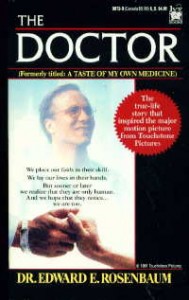ตอนสมัยเป็นนักศึกษาแพทย์ จำได้แม่นเลยครับว่า มีหนังสืออ่านนอกเวลาชื่อว่า “The Doctor” ซึ่งอยู่ในหลักสูตร แต่งโดย Dr. Edward E. Rosenbaum เนื้อหาโดยคร่าวๆกล่าวถึงหมอคนหนึ่งซึ่งต่อมาเป็นมะเร็งที่กล่องเสียง ต้องฉายแสง และต้องตกอยู่ในฐานะของคนไข้ จำรายละเอียดไม่ได้แล้วครับ เพราะนานมากแล้ว แต่จำได้ว่าเป็นหนังสือที่อ่านแล้วประทับใจมาก อ่านฉบับภาษาอังกฤษทั้งเล่มอย่างน้อย 2 รอบ รู้สึกเหมือนกับเคยทำเป็นหนังด้วย เพื่อนๆนักศึกษาแพทย์ตอนนั้นจำได้ว่าหลายคนไปหาหนังมาดู แต่ผมเองอ่านหนังสืออย่างเดียวครับ จำได้แม่นโดยเฉพาะตัวละครเอก ซึ่งเป็นหมอ ซึ่งมีความคิดและประสบการณ์ในการเป็นหมอมายาวนาน แต่ต้องตกอยู่ในฐานะคนไข้ ซึ่งความรู้สึกต้องต่างกันไปแน่นอน จากคนที่เคยเป็นผู้รักษา เป็นผู้ถูกรักษา จากคนที่เคยออกคำสั่ง หรือตัดสินใจในฐานะหมอ กลับต้องมาพึ่งคนอื่น ถูกออกคำสั่ง ฯลฯ
ประเด็นเล็กๆน้อยๆซึ่งบางครั้งในฐานะหมอเราเห็นว่าเป็นเรื่องธรรมดาเสียเหลือเกิน แต่พอตกเป็นคนไข้บ้างก็ว่าไม่ธรรมดา เพราะสภาพจิตใจต่างกันมาก เช่นเราบอกให้คนไข้ไปเจาะเลือด แล้วรอผลหรือให้มาฟังผลวันหลัง เราบอกไปด้วยความเคยชิน แต่ถ้าเราไม่มาเป็นคนไข้เองเราเคยคิดไหมว่า ขณะที่เขาถูกเจาะเลือด หรือรอผลเลือดเขาจะมีความกังวลมากแค่ไหน โดยเฉพาะถ้าหมอกำลังสงสัยโรคร้ายแรงต่างๆ เขาอาจจะกลุ้มใจ กินไม่ได้นอนไม่หลับ ระหว่างที่รอผลการตรวจ ซึ่งหมอๆอย่างพวกเราควรต้องคำนึงถึงจุดนี้ไว้บ้าง
นี่คือหน้าปกหนังสือครับ
มีหลายช่วงในหนังสือที่ผมชอบ เลยจดเอาไว้ครับ เช่น
It’s the life of a doctor
Everyday of my life as a doctor, I have had to make decisions that could mean life or death for someone else. I always did my best, but I am human. At times there would be alternative pathways that I didn’t know about. On rare occasions, I have strayed and taken the wrong road,and both I and the patient have had to live with the decision that I seriously considered changing professions, but as time went on, the process became more automatic and was based on statistical probabilities. I adjusted, “It’s the life of a doctor”, I told myself.
Never say, “You are going to die”
I have never in all of my life been able to say to a patient, “You are going to die”. This is the way we talk to a condemned murderer. Why do that to the innocent patient?
Hope is essential. To rob a patient’s hope is cruel.
“I dont’ know”
“It occurs in heavy smoker and heavy drinker”
“That’s not me” I answered. “I neither smoke or drink”
He didn’t reply; only turned on his heel and walked out. A typical doctor, I thought; it’s impossible for him to say, “I don’t know”.
“It has taken me years to utter those words. From the first day of medical school, young doctors understand that they can never learn it all, yet they are constantly questioned and tested and expected to give answers. From day one they are conditioned never to say, “I don’t know”. There are many diseases of unknown cause and for which there is no treatment, yet there are endless medical papers and medical texts discussing their causes and therapy.
อีกคำพูดครับที่ผมชอบมาก
One of the cruelest things a doctor can do is to keep the patient waiting.
Dr. Edward E. Rosenbaum
เป็นหนังสือแนะนำเลยครับ เหมาะมากสำหรับนักศึกษาแพทย์ และหมอๆทั้งหลาย ลองอ่านดูนะครับ ผมไม่แน่ใจว่าจะหาซื้อได้ที่ไหน แต่เชื่อว่าตามห้องสมุดคณะแพทย์น่าจะยังพอมีอยู่
